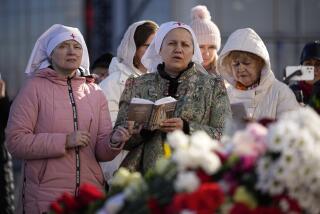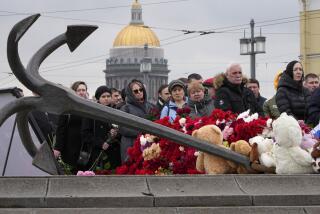Pro-Communist Marchers Battle Moscow Police
- Share via
MOSCOW — Police brandishing nightsticks clashed Sunday with hard-line Communist demonstrators as they tried to force their way to the Kremlin to mark the 74th anniversary of the Red Army with an anti-government rally.
It was the first time violence has been used to control a mass demonstration since Boris N. Yeltsin was elected president of Russia in May, 1990.
The protesters, chanting “Yeltsin resign!” and calling for a return of Soviet power, were beaten with rubber truncheons as they tried to shove their way past police barricades on the city’s main shopping avenue, Tverskaya Street.
Dozens of protesters suffered bruises, concussions and other injuries, but no one was hospitalized and there were no arrests. At least 18 policemen were injured, none seriously, according to Vladimir Kogut, a Moscow police officer.
The violence was sparked when about 3,000 demonstrators carrying red Soviet flags and portraits of Bolshevik leaders V. I. Lenin and Josef Stalin demanded to hold a rally in honor of Red Army Day, now officially called Armed Services Day, outside the walls of the Kremlin.
Moscow Mayor Gavriil Popov had banned demonstrations in the city center and posted thousands of police with truncheons and shields to prevent anti-government rallies from disrupting the official holiday celebration.
Yeltsin, Vice President Alexander V. Rutskoi, other high Russian officials and top military officers placed wreaths at the tomb of the unknown soldier next to the Kremlin Wall.
Just a couple of blocks away, several demonstrators holding large Soviet flags charged into a cordon of police. Other protesters tried to overturn a large truck that blocked their path, while thousands of others gave them verbal support by shouting: “Yeltsin is a fascist!” and “Sovietsky Soyuz!” --Russian for Soviet Union.
At one point, a 16-year-old boy dressed in military clothes clambered atop a truck on the barricade and unfurled a large red flag with a portrait of Lenin. Special troops wearing helmets pounced on the teen-ager, hitting him with truncheons and kicking him with their heavy boots.
Later, his face still puffy and pink from tears, the blond, blue-eyed schoolboy was surrounded by elderly ladies who smothered him with kisses and praised his bravery.
“I stood up there because I support communism, I support Lenin,” German V. Lopatin, the boy, said. “And I am sure we will be victorious in the end.”
Lopatin echoed the sentiments of many in the crowd by criticizing the democratically elected authorities’ use of police force to stamp out their demonstration.
“To them, democracy is beating people in the face,” Lopatin said. “We came here with bare hands for a peaceful demonstration, and they punched us in the snout. Is this normal?”
Such force was not used by police during dozens of anti-Communist marches in 1990 and 1991. It recalled the early days of pro-democracy demonstrations, which were frequently broken up by Soviet police, although in those instances protesters were often detained or arrested by police.
Yelena M. Bonner, widow of dissident physicist Andrei D. Sakharov and herself a prominent human rights activist, criticized the Moscow authorities for not letting organizers hold the rally on Manezh Square outside the Kremlin.
“If this very small and insignificant rally had been allowed to be held in Manezh Square, which has been used for rallies by other organizations, nothing would have happened,” Bonner said. “This decision of the Moscow authorities only goes to show that the power structures in the country haven’t changed the methods they use. They still use the old methods.”
Popov, who forbade Sunday’s rally, sang a different tune last March when the Soviet government tried to enforce a ban on protests by posting 50,000 riot police and troops equipped with water cannon and horses in the city’s center.
Popov was launching his campaign for mayor at the time, and he told a rally of about 100,000 Yeltsin supporters: “We gather here, despite all the threats, to exercise the right of every Muscovite to freedom of speech.”
No injuries were reported after that demonstration.
But police and journalists defended Popov’s stand against Sunday’s pro-Communist rally.
“The militia cordons were absolutely justified,” police officer Kogut said. “If not for them, the number of injured would have been far greater. . . . Their intention was to create a confrontation with their opponents.”
Russian Television, which is sponsored by the government, also blamed the “red and brown,” or Communist and fascist, demonstrators.
“The united brown and red forces, in other words the anti-Yeltsin alliance of various chauvinistic groups, wanted to provoke a violent incident to put the blame for the violence on the government. They nearly succeeded. They managed to start a small scuffle. . . . Of course, this is a long way from the bloody Sunday (that they wanted).”
Sunday’s demonstration, and similar rallies over the last two months, reflect a growing attempt by ultra-conservatives to grasp popularity by exploiting the desperation felt by many Russians as they struggle to feed their families while prices soar because of Yeltsin’s economic policies.
The protest also underscored the increasing discontent and debasement felt by many servicemen as the 3.7-million-member Soviet army splits into national armies. Already the Slavic republics of Ukraine and Belarus, the southern republics of Moldova and Azerbaijan and the Central Asian republic of Uzbekistan have declared their plans to form their own armies.
One veteran wiped tears of humiliation and anger from his eyes after being beaten with a truncheon by a young policeman.
“I spent 40 years in the armed forces, and I get beaten with a truncheon when I come to honor the military, to which I gave most of my life,” Vladimir Adisonov, 54, said. “Can you imagine how insulted I feel? How can America support this government? At least 80% of the people are against Yeltsin. We’re not organized yet, but we will be.”
Sergei Loiko, a researcher in The Times Moscow Bureau, contributed to this report.
More to Read
Sign up for Essential California
The most important California stories and recommendations in your inbox every morning.
You may occasionally receive promotional content from the Los Angeles Times.













